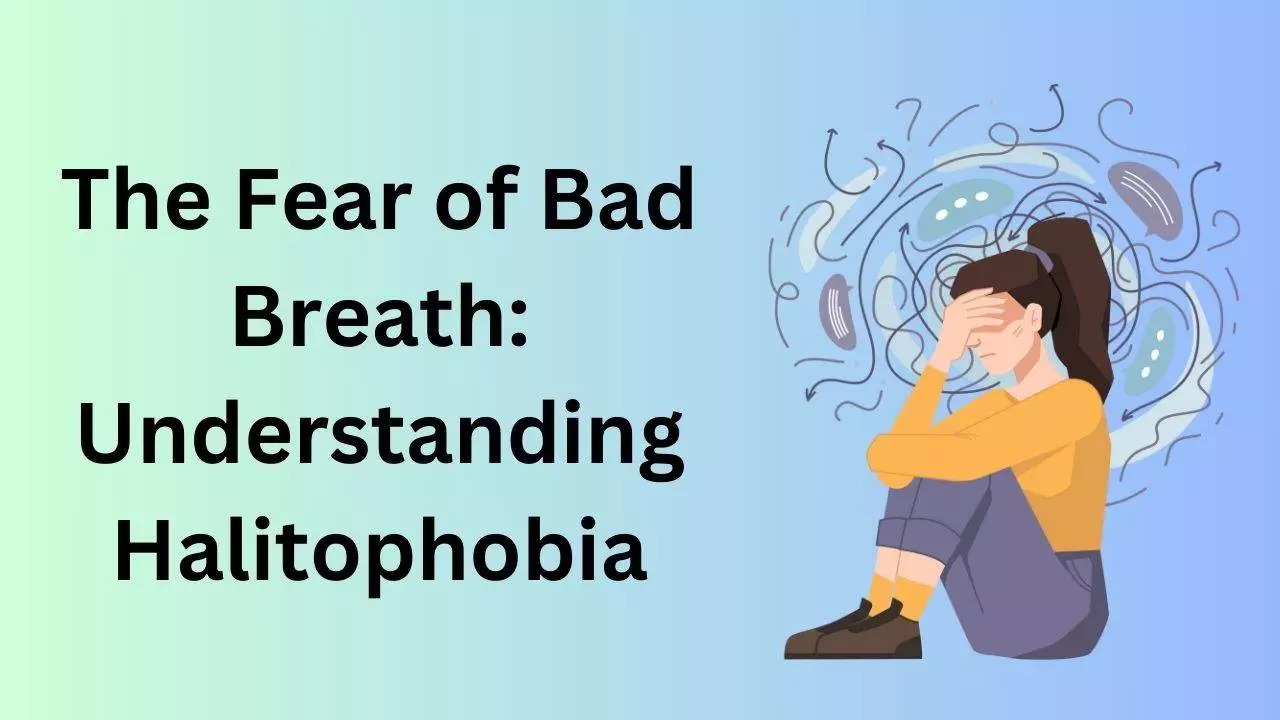
- What is Halitophobia?
- The Physical and Emotional Symptoms of Halitophobia
- The Causes of Halitophobia: Medical and Psychological Factors
- How Halitophobia Affects Daily Life and Relationships
- The Impact of Social Media on Halitophobia
- The Role of Self-Care in Managing Halitophobia
- The Importance of Seeking Professional Help for Halitophobia
- Halitophobia vs. Actual Bad Breath: Understanding the Difference
- Common Misconceptions About Halitophobia
- Halitophobia in Children and Adolescents
- Coping Strategies for Halitophobia: Tips and Techniques for Overcoming Fear
Halitophobia, also known as the fear of bad breath, is a condition that affects many individuals around the world. It is characterized by an irrational fear and obsession with having bad breath, even when there is no evidence to support this belief. This condition can have a significant impact on a person’s daily life and relationships, leading to social isolation and emotional distress. It is important to discuss this topic in order to raise awareness and provide support for those who may be suffering from halitophobia.
What is Halitophobia?
Halitophobia is a psychological condition characterized by an excessive fear and preoccupation with having bad breath, even when there is no evidence to support this belief. Individuals with halitophobia often engage in excessive oral hygiene practices, such as brushing their teeth multiple times a day or using mouthwash excessively, in an attempt to alleviate their fears. However, these practices do not provide any relief and the fear persists.
It is important to note that halitophobia differs from actual bad breath, also known as halitosis. While halitosis is a real condition that can be caused by poor oral hygiene, certain foods, or underlying medical conditions, halitophobia is a psychological condition that is not based on any real evidence of bad breath. Individuals with halitophobia may have perfectly normal breath, but their fear and obsession with having bad breath can be debilitating.
The Physical and Emotional Symptoms of Halitophobia
Individuals with halitophobia may experience both physical and emotional symptoms as a result of their condition.
Physical symptoms may include dry mouth, sore throat, or a constant need to clear the throat. These symptoms can be caused by excessive oral hygiene practices or anxiety associated with the fear of having bad breath.
Emotional symptoms of halitophobia can include anxiety, depression, low self-esteem, and social withdrawal. The constant fear and preoccupation with having bad breath can lead to feelings of shame and embarrassment, making it difficult for individuals to engage in social activities or maintain relationships.
These physical and emotional symptoms can have a significant impact on a person’s daily life, making it difficult to focus on work or school, and leading to social isolation and a decreased quality of life.
The Causes of Halitophobia: Medical and Psychological Factors
There are several factors that can contribute to the development of halitophobia, including both medical and psychological causes.
Medical causes of halitophobia may include underlying medical conditions that can cause bad breath, such as gum disease, sinus infections, or gastrointestinal issues. These conditions can lead to a real fear of having bad breath, which can then develop into halitophobia.
Psychological causes of halitophobia may include a history of trauma or abuse, obsessive-compulsive disorder (OCD), or body dysmorphic disorder (BDD). These psychological factors can contribute to the development of irrational fears and obsessions, such as the fear of having bad breath.
It is important to note that these medical and psychological factors do not cause halitophobia directly, but rather contribute to its development. It is a complex condition that is influenced by a combination of factors.
How Halitophobia Affects Daily Life and Relationships
Halitophobia can have a significant impact on a person’s daily life and relationships.
In personal relationships, individuals with halitophobia may avoid close physical contact with their partners or refrain from intimate activities due to their fear of having bad breath. This can lead to feelings of insecurity and strain on the relationship.
In professional relationships, individuals with halitophobia may feel self-conscious in the workplace and avoid interactions with colleagues or clients. This can hinder career growth and opportunities for professional development.
The fear of having bad breath can also lead to social isolation, as individuals with halitophobia may avoid social gatherings or public places where they fear their breath may be noticed. This can lead to feelings of loneliness and a decreased quality of life.
The Impact of Social Media on Halitophobia
Social media can exacerbate the symptoms of halitophobia, as it provides a platform for comparison and self-doubt. Individuals with halitophobia may see images or posts on social media that promote a certain standard of beauty or hygiene, leading to feelings of inadequacy and an increased fear of having bad breath.
Additionally, social media can perpetuate the stigma surrounding bad breath, as individuals may make negative comments or jokes about it online. This can further contribute to the fear and shame associated with halitophobia.
It is important for individuals with halitophobia to be mindful of their social media consumption and to remember that what they see online is often curated and not a true reflection of reality. Seeking support from online communities or professional help can also be beneficial in managing the impact of social media on halitophobia.
The Role of Self-Care in Managing Halitophobia
Self-care plays a crucial role in managing halitophobia and promoting overall well-being.
It is important for individuals with halitophobia to prioritize their mental and physical health. This can include engaging in regular exercise, practicing relaxation techniques such as deep breathing or meditation, and maintaining a balanced diet.
Practicing good oral hygiene is also important for individuals with halitophobia. However, it is important to strike a balance and avoid excessive oral hygiene practices that can further exacerbate the fear and obsession with having bad breath.
Seeking support from loved ones or joining support groups can also be beneficial in managing halitophobia. Talking openly about fears and concerns can help individuals feel understood and supported, reducing feelings of isolation.
The Importance of Seeking Professional Help for Halitophobia
If halitophobia is significantly impacting a person’s daily life and relationships, it is important to seek professional help.
A mental health professional, such as a therapist or psychologist, can provide support and guidance in managing the symptoms of halitophobia. They can help individuals identify and challenge irrational thoughts and beliefs, develop coping strategies, and work towards overcoming their fear of having bad breath.
In some cases, a medical professional may also be involved in the treatment of halitophobia. They can rule out any underlying medical conditions that may be contributing to the fear of bad breath and provide appropriate treatment if necessary.
It is important to remember that seeking professional help is not a sign of weakness, but rather a proactive step towards improving one’s mental health and overall well-being.
Halitophobia vs. Actual Bad Breath: Understanding the Difference
It is important to differentiate between halitophobia and actual bad breath in order to seek appropriate treatment and support.
Halitophobia is a psychological condition characterized by an irrational fear and preoccupation with having bad breath, even when there is no evidence to support this belief. Individuals with halitophobia may have perfectly normal breath, but their fear and obsession can be debilitating.
Actual bad breath, or halitosis, is a real condition that can be caused by poor oral hygiene, certain foods, or underlying medical conditions. It is important to seek medical attention if bad breath persists despite practicing good oral hygiene.
Understanding the difference between halitophobia and actual bad breath can help individuals seek appropriate treatment and support for their specific needs.
Common Misconceptions About Halitophobia
There are several common misconceptions about halitophobia that can perpetuate stigma and misunderstanding surrounding the condition.
One common myth is that individuals with halitophobia are simply overly concerned about their oral hygiene. However, halitophobia is a psychological condition that is not based on any real evidence of bad breath. It is important to recognize that individuals with halitophobia may have perfectly normal breath, but their fear and obsession can be debilitating.
Another myth is that halitophobia is a rare condition. However, it is estimated that a significant number of individuals around the world may be suffering from halitophobia, but are often too embarrassed or ashamed to seek help.
Debunking these myths and raising awareness about halitophobia can help reduce stigma and encourage individuals to seek the support they need.
Halitophobia in Children and Adolescents
Halitophobia can also affect children and adolescents, leading to similar physical and emotional symptoms as in adults.
Children and adolescents with halitophobia may experience difficulties in school, such as difficulty concentrating or participating in class due to their fear of having bad breath. They may also avoid social activities or interactions with peers, leading to feelings of isolation and low self-esteem.
Parents and caregivers can play a crucial role in supporting children and adolescents with halitophobia. It is important to provide a safe and supportive environment where they feel comfortable discussing their fears and concerns. Seeking professional help, such as therapy or counseling, can also be beneficial in managing halitophobia in children and adolescents.
Coping Strategies for Halitophobia: Tips and Techniques for Overcoming Fear
There are several coping strategies that can be helpful in managing halitophobia and overcoming the fear of having bad breath.
Cognitive-behavioral therapy (CBT) is a commonly used therapeutic approach for treating halitophobia. It focuses on identifying and challenging irrational thoughts and beliefs, developing coping strategies, and gradually exposing individuals to situations that trigger their fear of bad breath.
Exposure therapy is another effective technique for managing halitophobia. It involves gradually exposing individuals to situations that trigger their fear of having bad breath, allowing them to confront their fears in a controlled and supportive environment.
Mindfulness techniques, such as deep breathing or meditation, can also be helpful in managing anxiety and reducing the symptoms of halitophobia. These techniques can help individuals stay present in the moment and reduce the impact of negative thoughts and beliefs.
Other coping strategies for halitophobia may include journaling, engaging in creative outlets such as art or music, and seeking support from loved ones or support groups.
Halitophobia is a psychological condition characterized by an excessive fear and preoccupation with having bad breath, even when there is no evidence to support this belief. It can have a significant impact on a person’s daily life and relationships, leading to social isolation and emotional distress.
It is important to raise awareness about halitophobia in order to provide support and understanding for those who may be suffering from this condition. Seeking professional help, practicing self-care, and challenging irrational thoughts and beliefs are important steps towards managing halitophobia and improving overall well-being.
If you or someone you know is struggling with halitophobia, it is important to seek professional help. Remember that you are not alone, and there are resources available to support you on your journey towards healing and recovery.









